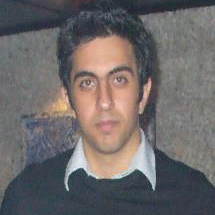
Behnam Torabi
Work place: Department of Artificial Intelligence, University of Isfahan, Isfahan, Iran
E-mail: behnam.torabi@eng.ui.ac.ir
Website:
Research Interests: Data Structures and Algorithms, Image Processing, Image Manipulation, Image Compression, Pattern Recognition
Biography
Behnam Torabi was born in Isfahan, Isfahan Province, Iran on May 20th1986. Behnam is now a graduate student at University of Isfahan. He was awarded the Degree of Bachelor of Software Engineering in recognition of his successful completion of the 4-year programmed Engineering courses in University of Isfahan (UI), Isfahan, Iran on September 19st, 2010. During his undergraduate study in UI, he participated in many student research programs. He served as teacher Assistant of Basic Programming from Oct.2008 to Sep. 2010. As a result of his research work, he has a paper accepted by international conferences indexed. His previous and current research interests include: robotics, image processing, pattern recognition and algorithms.
Author Articles
Automatic Speech Segmentation Based On Audio and Optical Flow Visual Classification
By Behnam Torabi Ahmad Reza Naghsh Nilchi
DOI: https://doi.org/10.5815/ijigsp.2014.11.06, Pub. Date: 8 Oct. 2014
Automatic speech segmentation as an important part of speech recognition system (ASR) is highly noise dependent. Noise is made by changes in the communication channel, background, level of speaking etc. In recent years, many researchers have proposed noise cancelation techniques and have added visual features from speaker’s face to reduce the effect of noise on ASR systems. Removing noise from audio signals depends on the type of the noise; so it cannot be used as a general solution. Adding visual features improve this lack of efficiency, but advanced methods of this type need manual extraction of visual features. In this paper we propose a completely automatic system which uses optical flow vectors from speaker’s image sequence to obtain visual features. Then, Hidden Markov Models are trained to segment audio signals from image sequences and audio features based on extracted optical flow. The developed segmentation system based on such method acts totally automatic and become more robust to noise.
[...] Read more.Other Articles
Subscribe to receive issue release notifications and newsletters from MECS Press journals